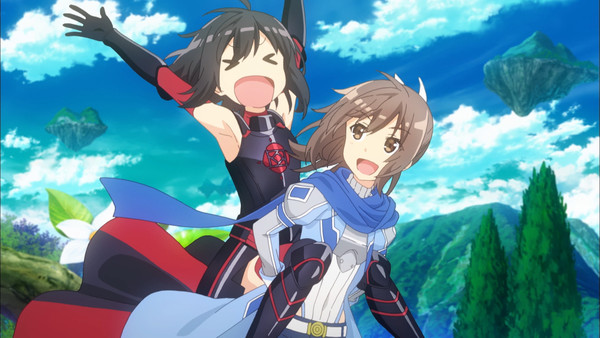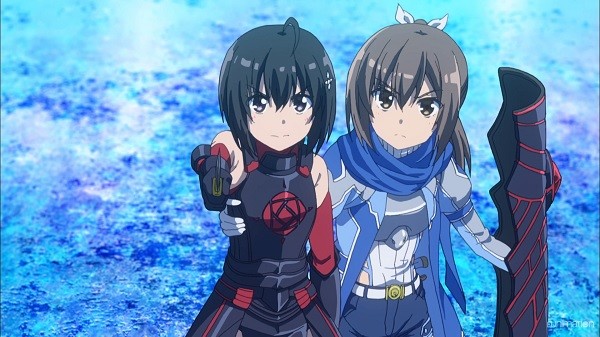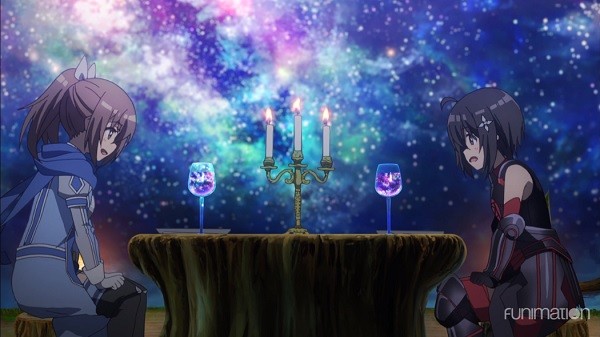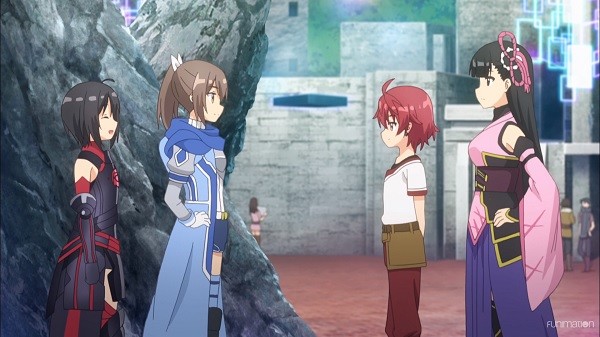How BOFURI Defies Gamer Expectations
by Christopher Farris,The concept of virtual-reality online games as a setting has been common in light novels, manga, and anime for ages now. There's considerable crossover in the audiences of those entertainment mediums and MMOs themselves, so creating stories speaking to those kinds of experiences makes sense. However, focusing on appealing to established fans of online role-playing games can run the risk of alienating those not already interested in exploiting stat systems or the specific kinds of progression featured in those types of games. It could be argued that such broad appeal isn't necessary, and that MMO shows should be ‘for’ people who already enjoy MMOs. But a little show from last year proved how well going the other direction could work. BOFURI: I Don't Want to Get Hurt, so I'll Max Out My Defense was a series for people who wouldn't have the first clue how to go about playing an MMO, by featuring an equally-clueless main character who not only comes to enjoy the game on her own terms, but ends up thriving in it as a direct result of her unorthodox approach.

This is another way BOFURI differentiates itself in its entertainment value. More typical VRMMO shows (to say nothing of their close cousins in the isekai genre) feature detailed scenes of their protagonists getting a rote rundown of the in-game systems, who then pursue the best builds and methods to exploit said systems for power-ups.
Maple decidedly does not do that.
Rather, with no prior understanding of how MMO mechanics are supposed to work, she hits on a basic strategy that seems perfectly logical from her viewpoint: She wants to get hurt as little as possible, so she puts literally all of her experience points into defense attributes. As ridiculously as it's presented, there's a kernel of relatable truth to her methodology; as someone who tends to not be terribly skilled at games like this myself, I've also tried prioritizing health and defense points for the various characters I've built in different games. The way Maple's choices then snowball into situations where her abilities escalate exponentially simply plays into that universal fantasy embodied by the game in BOFURI: that you can play in whichever way you want, even making left-field choices purely as a result of your inexperience, and the game will still ‘work’ for you and you'll be able to have fun.
Of course, Maple's status as a tremendously terrifying turbo-Tank only marks her as one particular class that can be constructed in NWO, and we must remember that the entire reason she jumped into it in the first place was to play with her friends. Her better half Risa constructs her character of ‘Sally’ around a low defense/high speed build more typical of those aforementioned min-max experienced players, but which serves her narrative purpose of showing what someone playing the game ‘normally’ looks like compared to Maple.

But far from simply a functional foil to Maple, Sally exists more as a complement, an assertion of how all playstyles can be viable for the sake of fun in a game. Just joining up with her bestie allows Sally to carry Maple (literally) to compensate for her low speed, and even Sally's higher-risk choices in build and playstyle are shown to be encouraged more than they normally would by the rewards of Maple's offbeat approach.
This becomes a theme as the series goes on, illustrating how Maple's unwitting successes at the behest of simple impulsive fun inspire the other friends and guildmates she accumulates. Twins Mai and Yui shoot for offense-focused builds which they initially struggle with, but gradually grow into after being welcomed into Maple Tree. Seasoned Shielder Chrome initially played NWO in a much more typically ‘safe’ way, but after interacting with Maple begins taking wilder risks, such as donning a special set of cursed armor that even he admits he wouldn't have felt comfortable using before. At every turn, the implication is that experiencing Maple's free-wheeling approach to playing helps her friends and fellow players loosen up to push forward with their own style instead of playing the game the way they thought they were ‘supposed’ to, not necessarily to reap stat bonuses, but simply to up their enjoyment of the game.
That aspect is reinforced by what we're shown of NewWorld Online's game design. Up-front, a key feature of BOFURI's setting is that it is simply just a game. The characters aren't trapped in the virtual realm trying to find a way to escape, and there are no nefarious real-world schemes spinning out of any in-game conflicts. Even the tournaments and competitions that form the basis of a couple of arcs aren't presented with any major stakes apart from simply being something to do. As such, even with all its fancy fights, BOFURI is presented less like a battle-action or competitive series, and more akin to a pleasant iyashikei series about engaging in a fun activity with your friends. To this end, the series can show off elements of NWO's design that don't directly serve combat or character building, like scenic sunset areas to take in or beautiful nighttime date spots. It suggests that the game's appeal is as much similar to VRchat as it is Final Fantasy XIV, continuing to advocate for the fun-first ideas of the series.

Ironically, such a design philosophy is indirectly responsible for Maple stumbling into the overpowered options that the NWO dev team has to reckon with. Amongst those aforementioned scenic elements, the game also has in-setting food that the players are capable of eating and tasting. An ambitious and entertaining selling point for this release, to be sure, except that said functionality ends up allowing Maple to eat ANYTHING in the game world given the opportunity—including dangerous, poisonous enemies and bosses. A few monsters-made-meals later, Maple has generously leveled up and internalized some formidable poison powers. This is just one example of a continuing trend of our heroine not just playing the game unconventionally, but in ways the designers straight-up never intended.
As BOFURI goes on, it becomes apparent that the seeming lack of developer oversight for NWO is more of a bug than the feature Maple exploits for all its worth. She tacks a competition- winning bonus onto her adorable pet turtle Syrup which she then uses as a flying transport. At one point, utilizing this to bypass a dangerous forest in an escort mission, she discovers that the relevant NPC doesn't have appropriate dialogue built in to account for such a workaround. It's not only a funny little reference to the kind of glitch many of us have encountered in games ourselves, but also reinforces the notion that NWO is ‘just a game’, and one that its developers are still working on ironing all the kinks out of.
Even as the admins prove incapable of really slowing down Maple's power-attaining progress, it's almost endearing to see them try, rolling out an actual ‘nerf’ to her abilities (an almost comical setback I feel like you'd never see applied to more ‘serious’ overpowered MMO anime heroes) only to go back to panicking as she stumbles into another way to break their game in half time and time again. It is funny, but it's also another component of BOFURI's philosophy, that not even the creators of a game themselves should have full say in how you have fun with it, and that by taking creative approaches to better yourself, you can actually push the people behind the game to do better as well. NWO ends up becoming a more well-thought-out, tightly-balanced experience as a direct result of Maple's approach, an influence that extends not just to her friends and the people making the game, but even the players she ends up competing against.

There's a perhaps not-unearned reputation of more hardcore, competitive online gamers having a tendency to be less than pleasant people, especially to neophytes to the medium. And this translates over to anime takes on the subject as well, where ambitious rivals deploy duplicitous schemes in the name of taking video games as completely serious business. This element is also present in BOFURI, at least initially. The Holy Sword guild regards Maple and her team as a threat to be investigated and conceive counters to. And while the likes of Sally at first attempt to shield the guild leader from these less fun-focused formalities, there comes a point where Maple cannot avoid direct conflict with these enemies.
The shocking part comes from how Maple sticks to her principles to the very end, even in defiance of the other players' assertions of how she ‘should’ be playing, prioritizing protecting her friends in- game over merely playing to win. And the supreme irony comes in the fact that Maple and her guild don't win the event, instead ending up a distant third place behind the two ‘harcore’ guilds everyone expected to emerge victorious. But points-allotted victory doesn't matter in the worldview espoused by BOFURI, and Maple's endearing attitude and later assistance of her then-enemies mean they all end up coming over to her house for a victory party when all is said and done. It's neatly encapsulated in her dispensing the simple wisdom of “There's no sides when the fighting stops”. For Maple, the object of the game is to have fun with all the friends you can make, and in that respect, she's playing as correctly as possible.
Maple's distinct approach to online games doesn't ring true for everyone, it can't. But crucially, she welcomes all other players as friends into her life, encouraging them to get along and have more fun in the game along the way. It's no wonder the devs opt by the end of the anime series simply to let her continue evolving, observing from afar as she's become the compelling face of the game for further new players. It's the kind of appreciable engagement that any real- life game would love to have as a promotional aspect: Inviting proof that there's no wrong way to play.
discuss this in the forum (28 posts) |